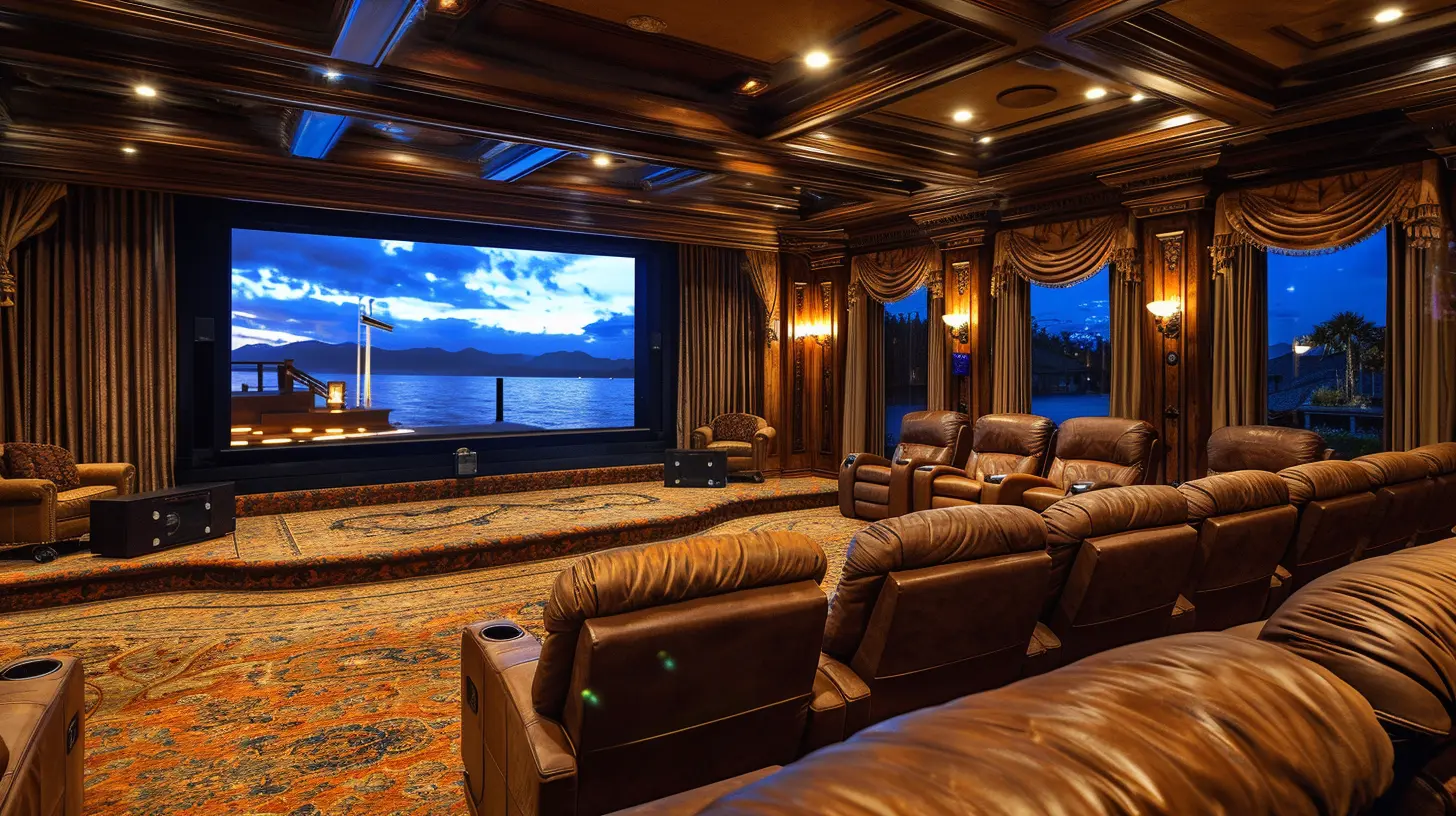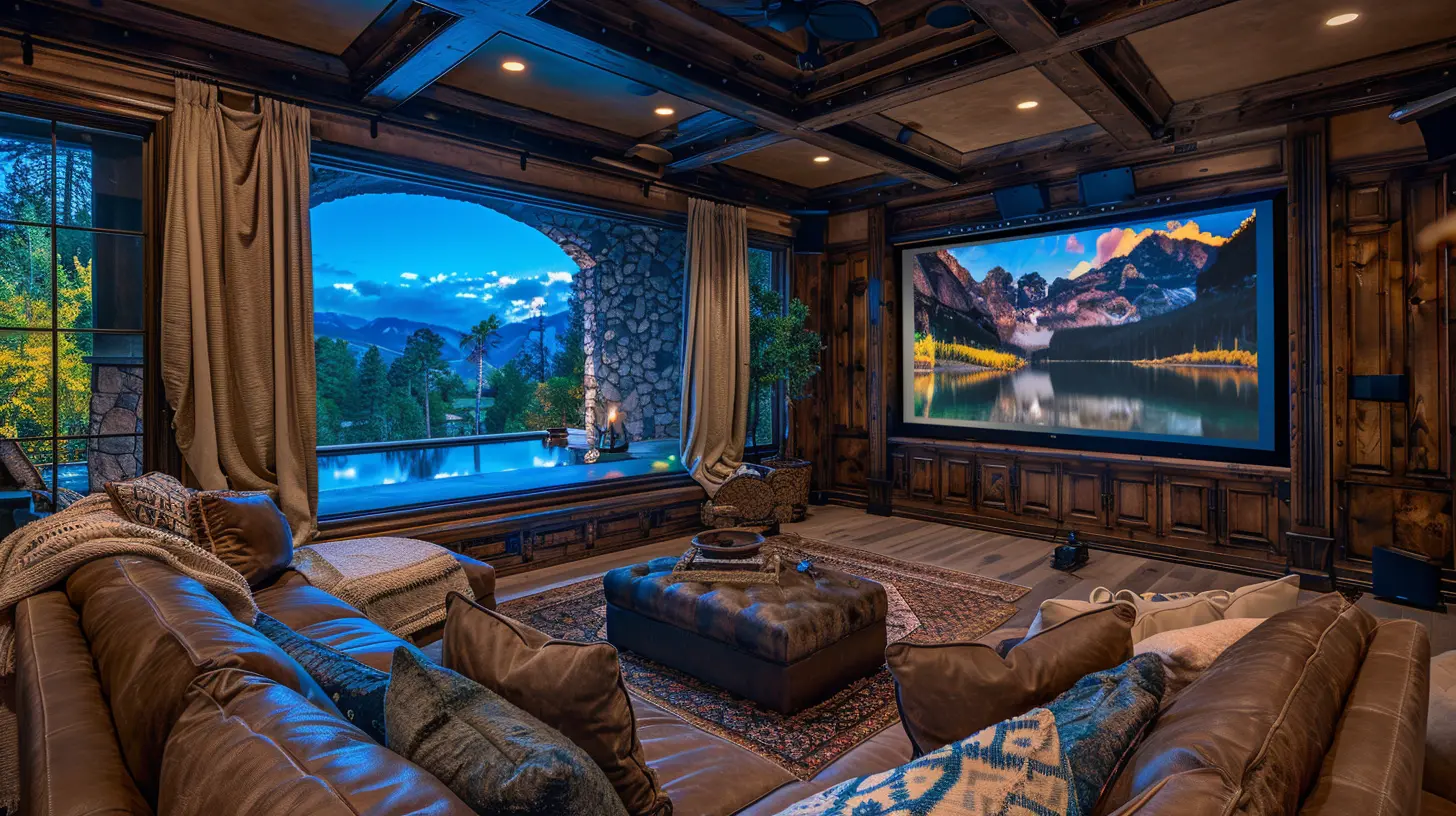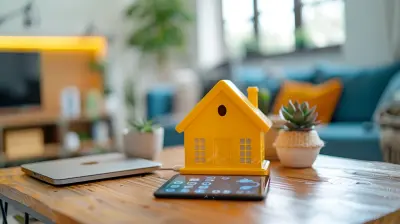How to Build a Smart Home Theater System
14 February 2025
In today's world, where technology is advancing at an unprecedented pace, creating a smart home theater system isn’t just a luxury—it’s an essential part of a modern home. Imagine transforming your living room into a mini-cinema where everything is automated, from lighting to sound to video. Want to pause the movie with just your voice? Yep, that’s possible. Want your lights to dim the moment you hit play? That’s doable too.
Building a smart home theater system can seem daunting, but don’t worry—I’ve got you covered. By the end of this guide, you’ll know exactly what you need, how to set it up, and how to make the most of your tech-savvy entertainment center. Ready? Let’s dive in!

Why Build a Smart Home Theater System?
Before we jump into the “how,” let’s talk about the “why.” Why should you even consider turning your ordinary TV setup into a smart home theater system?Well, for starters, convenience. Imagine controlling your entire entertainment setup—TV, speakers, lights, thermostat, and more—from your smartphone or even better, with just your voice. That’s the magic of a smart home theater system.
Then there’s the experience. A smart system can give you that cinematic feel without having to leave the house. Not to mention the quality of sound and video you can get nowadays is mind-blowing. And let’s not forget about future-proofing your home. With the rise of smart homes, having a smart theater system will make sure you’re keeping up with the trend.

What You’ll Need to Get Started
Now that you’re sold on the idea (I knew you would be), let’s talk about what you’ll need to build your smart home theater system. While there are many components to consider, the key here is compatibility. You want devices that can communicate with each other seamlessly. Here’s a breakdown of the essential elements:1. Smart TV
The TV is the heart of your home theater system. Gone are the days when a TV was just a box to watch shows on. Today’s smart TVs come with built-in apps, Wi-Fi, and even voice assistants like Amazon Alexa or Google Assistant. When choosing a smart TV, look for features like 4K resolution, HDR support, and a smooth interface. Brands like Samsung, LG, and Sony offer some of the best options in the market.Pro Tip: If you’re already invested in an ecosystem, like Google Home or Amazon Alexa, make sure your TV is compatible with it.
2. Smart Speakers (or Soundbar)
What’s a home theater without killer audio? A great sound system can make or break your viewing experience, and smart speakers or soundbars are perfect for this. You can go for a multi-speaker setup—like a 5.1 or 7.1 surround sound system—or opt for a high-quality soundbar.Smart speakers like the Sonos Beam or Bose Smart Soundbar can be controlled with your voice, and they offer excellent sound quality. If you want a full surround sound experience, look for a system that supports Dolby Atmos.
3. Smart Lighting
The lighting in your home theater can really set the mood. Smart lighting systems like Philips Hue allow you to control the brightness and color of your lights right from your phone or voice assistant. You can even sync the lights with your movie for a more immersive experience. Want the lights to automatically dim when the movie starts? You can do that too.4. Streaming Devices
Most smart TVs come with built-in streaming apps like Netflix, Hulu, and Amazon Prime. However, if you want more flexibility, consider adding a streaming device like a Roku, Amazon Fire Stick, Google Chromecast, or Apple TV. These devices allow you to stream content in 4K and offer additional features like screen mirroring and app integration.5. Universal Smart Remote or Hub
Let’s be honest—no one likes juggling five different remotes. This is where a universal smart remote or hub comes in. A device like the Logitech Harmony Hub can control everything from your TV to your speakers to your lights, reducing clutter and making things incredibly convenient. Some smart hubs even integrate with voice assistants, allowing you to control your theater setup hands-free.6. Voice Assistant
Speaking of hands-free control, a voice assistant is a must-have for any smart home theater system. Whether you prefer Amazon Alexa, Google Assistant, or Apple’s Siri, voice control adds a layer of convenience that’s hard to beat. From turning on the TV to adjusting the volume to finding a movie, voice assistants make it all super easy.7. Smart Plugs and Power Strips
Smart plugs and power strips allow you to control non-smart devices in your setup. For example, if you have a traditional lamp, you can plug it into a smart plug and control it with your voice or smartphone. Smart power strips can also help you save energy by automatically turning off devices when they’re not in use.8. Home Automation Platform
To tie everything together, you’ll need a home automation platform. Popular platforms include Amazon Alexa, Google Home, and Apple HomeKit. These platforms act as the brain of your smart home theater, allowing all your devices to work in harmony. With a good home automation system, you can create routines like “Movie Time,” which automatically turns on your TV, dims the lights, and starts your sound system with a single command.
How to Set Up Your Smart Home Theater System
Now that you’ve got all the necessary components, it’s time to put everything together. Here’s a step-by-step guide to help you set up your smart home theater system.Step 1: Plan Your Layout
Before you start plugging things in, take a moment to plan your space. Where will the TV go? How about the speakers and lighting? Make sure everything is positioned for optimal viewing and sound. If you’re going for a surround sound setup, place your speakers strategically for the best audio experience.Step 2: Set Up Your Smart TV
Once your TV is in place, connect it to your Wi-Fi and log into your streaming apps. Don’t forget to enable voice control if your TV supports it. If you’re using an external streaming device, plug it into your TV’s HDMI port and follow the setup instructions.Step 3: Connect Your Smart Speakers or Soundbar
Next, connect your smart speakers or soundbar to your TV. Most modern soundbars can connect via HDMI ARC (Audio Return Channel) or optical cable for the best sound quality. If you’re using smart speakers, you may need to configure them using the manufacturer’s app.Step 4: Install Smart Lighting
If you’re using smart bulbs or light strips, install them in your home theater room and connect them to your home automation platform. This will allow you to control the lights with your voice or smartphone.Step 5: Sync Everything with Your Home Automation Platform
Once all your devices are set up, sync them with your home automation platform. For example, if you’re using Google Home, open the Google Home app and add your devices. You can then create routines like “Movie Night” to automate your home theater experience.Step 6: Customize Your Experience
Finally, customize your smart home theater to your liking. Adjust the lighting to match your mood, fine-tune the sound settings on your speakers, and experiment with voice commands to control your setup effortlessly.
Tips for Optimizing Your Smart Home Theater System
Building a smart home theater is just the beginning. Here are a few tips to optimize your setup for the best experience:1. Use Routines and Scenes
Most home automation platforms allow you to create routines or scenes. For example, you can create a “Movie Night” routine that dims the lights, turns on the TV, and sets the sound to your preferred volume—all with a single voice command or tap on your phone.2. Upgrade Your Wi-Fi
Since your entire smart home theater system relies on Wi-Fi, it’s worth investing in a good router. If you have a large home or multiple smart devices, consider upgrading to a mesh Wi-Fi system to ensure smooth streaming and uninterrupted voice control.3. Keep Your Devices Updated
To get the most out of your smart home theater system, make sure all your devices are running the latest software. Manufacturers often release updates that improve performance, fix bugs, and add new features.4. Experiment with Smart Home Features
Don’t be afraid to experiment with the features of your smart home theater system. For example, you can sync your lights with your TV for an immersive experience or set up voice commands to control everything hands-free.Conclusion: Ready to Build Your Smart Home Theater?
Building a smart home theater system doesn’t have to be complicated or expensive. With the right components and a little bit of planning, you can transform your living room into a high-tech entertainment hub that rivals the local cinema.From smart TVs to voice-controlled sound systems to automated lighting, the possibilities are endless. So, what are you waiting for? It’s time to kick back, grab some popcorn, and enjoy the ultimate movie night in your smart home theater!
all images in this post were generated using AI tools
Category:
Smart HomeAuthor:

Jerry Graham
Discussion
rate this article
15 comments
Melody McVicker
Great overview! Your tips on equipment selection and smart integration are spot on. I appreciate the emphasis on user-friendly interfaces, as an intuitive setup makes or breaks the home theater experience. Looking forward to more insights!
March 27, 2025 at 4:24 AM

Jerry Graham
Thank you for your kind words! I'm glad you found the tips helpful. Stay tuned for more insights!
Mary McTier
Great insights! Excited to integrate these tips into my setup.
March 17, 2025 at 3:20 AM

Jerry Graham
Thank you! I'm glad you found the tips helpful. Enjoy your smart home theater setup!
Zeal McEvoy
Great article! Setting up a smart home theater can be an exciting journey, transforming your space into a cinematic experience. Your tips are practical and easy to follow. Can't wait to try them out and enjoy movie nights like never before! 🎬✨
March 12, 2025 at 10:00 PM

Jerry Graham
Thank you for your kind words! I'm glad you found the tips helpful. Enjoy your cinematic adventures! 🎥😊
Cora McVicar
What innovative tech makes your ideal smart theater experience?
March 12, 2025 at 3:31 AM

Jerry Graham
An ideal smart theater experience features automated lighting, immersive audio systems like Dolby Atmos, seamless streaming integration, and voice-controlled devices for effortless operation.
Carter Sheppard
This article sparks my imagination! I’m excited to learn about the latest tech and innovative ideas for creating the ultimate smart home theater experience. Let’s dive in!
March 9, 2025 at 5:45 AM

Jerry Graham
I'm glad you found it inspiring! Excited to share more on creating your ultimate smart home theater experience!
Romina Duffy
Building a smart home theater system transforms your entertainment experience. Prioritize key components like a high-quality sound system, 4K display, and seamless streaming integration for a truly immersive setup. Go for it!
March 6, 2025 at 7:36 PM

Jerry Graham
Absolutely! Prioritizing quality components like sound, display, and streaming is essential for an immersive home theater experience. Enjoy the journey!
Juniper Benton
Building a smart home theater system elevates your entertainment experience. Prioritize compatibility and user-friendly interfaces to seamlessly integrate technology and enjoy cinematic bliss at home!
March 2, 2025 at 12:21 PM

Jerry Graham
Thank you! Prioritizing compatibility and ease of use truly enhances the smart home theater experience for everyone. Enjoy the cinematic bliss!
Kassidy McEvoy
Creating a smart home theater is about balance—integrate technology that enhances your experience while ensuring simplicity and user-friendliness. Focus on quality audio-visual elements, intuitive controls, and seamless connectivity for ultimate enjoyment.
February 27, 2025 at 1:41 PM

Jerry Graham
Absolutely! Striking that balance is key to a great smart home theater experience. Prioritizing quality and simplicity will truly enhance enjoyment.
Ariana Erickson
This article beautifully captures the essence of creating a smart home theater. Your insights on technology integration and user experience are invaluable. Thank you for guiding us toward our dream entertainment space!
February 23, 2025 at 5:25 AM

Jerry Graham
Thank you for your kind words! I'm glad you found the insights helpful for your smart home theater journey. Enjoy your dream entertainment space!
Sera McClure
Great article! Setting up a smart home theater can feel overwhelming, but your tips make it so much easier. I love the idea of integrating different devices for a seamless experience. Can’t wait to try these out in my own setup! 🎬✨
February 22, 2025 at 8:00 PM

Jerry Graham
Thank you! I'm glad you found the tips helpful. Enjoy setting up your smart home theater! 🎉
Ingrid Snow
Smart home theaters: because binge-watching deserves a worthy throne—upgrade your couch!
February 22, 2025 at 4:55 AM

Jerry Graham
Absolutely! A comfortable, high-quality couch enhances the binge-watching experience, making it even more enjoyable. Upgrade for the ultimate movie night!
Skylar Lane
Great tips for an immersive experience!
February 21, 2025 at 3:37 AM

Jerry Graham
Thank you! I'm glad you found the tips helpful for enhancing your home theater experience!
Signe Mullen
Unlock the secrets of an immersive experience! Building a smart home theater isn't just about tech—it's about crafting a portal to another world. Dare to explore?
February 18, 2025 at 9:47 PM

Jerry Graham
Absolutely! Crafting a smart home theater is all about blending technology with creativity to create an unforgettable escape. Let's dive in!
Destiny Brooks
Transform your living room into a cinematic wonderland—just remember, popcorn is a vital component of tech success!
February 17, 2025 at 1:32 PM

Jerry Graham
Absolutely! Popcorn and a great setup are the perfect combo for a movie night. Enjoy the show! 🍿
Greta Wolfe
Great article! You’ve covered essential steps for creating a smart home theater system effectively. Integrating user-friendly devices and smart controls really enhances the experience. Looking forward to trying out some of these tips!
February 16, 2025 at 4:19 AM

Jerry Graham
Thank you so much for your kind words! I'm glad you found the tips helpful. Enjoy building your smart home theater!
MORE POSTS

Exploring the World of VR in Mobile Gaming

The Best AR Glasses for Enhanced Shopping Experiences

Cloud Gaming on Smart TVs: What You Need to Get Started

E-Commerce Shipping Solutions: Trends and Innovations

Hydropower at Home: Low-Impact Energy Solutions for the Modern Consumer

How to Secure Your Smart Home from Cyber Threats

The Top Mobile Controllers to Level Up Your Gaming Experience

Data Analytics for Human Resources: Unlocking Employee Insights

How to Make Your Home Smarter With Minimal Effort

How Digital Assistants Can Simplify Your Grocery Shopping